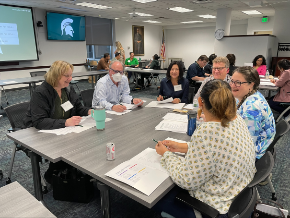Early Career Mentoring Programs
 To supplement departmental mentoring activities, the college offers an evolving set of programs that provide junior faculty with the knowledge, skills, and attitudes needed for success in their academic roles. Our programs are grounded in recommendations from literature in academic medicine and focus on best practices for supporting faculty and aiding their personal and professional development.
To supplement departmental mentoring activities, the college offers an evolving set of programs that provide junior faculty with the knowledge, skills, and attitudes needed for success in their academic roles. Our programs are grounded in recommendations from literature in academic medicine and focus on best practices for supporting faculty and aiding their personal and professional development.
Mentoring unequivocally benefits faculty and leads to greater job satisfaction. Mentoring can improve faculty’s feelings of academic self-efficacy and can help in the development of professional networks. Evidence suggests mentoring increases outputs like publications in peer-reviewed outlets and grant support. Mentoring also helps build community and collegiality. Through mentoring structures, we help new faculty members understand our culture and provide a safe space to discuss challenges.
Promotion Bootcamp
In the spring of 2021, a focus group of fixed term faculty and academic specialists in the college provided input on mentoring needs for faculty in these appointment systems. These ideas have evolved into several offerings, including the CHM Promotion Bootcamp, which began in the spring of 2025. The Bootcamp supplements departmental mentoring by providing focused mentor support, dedicated writing time, and “accountability buddies” for faculty preparing for a promotion or similar action in the next academic year. All MSU-paid faculty and non-prefix faculty are eligible to apply. Seats are determined by the availability of mentors.
Tenure System Mentoring Program
In the fall of 2005, a college-level Faculty Excellence Task Force offered recommendations to improve the support for tenure-system faculty in the College of Human Medicine. The Tenure System Mentoring Program supplements the work of departmental mentoring programs by providing targeted mentoring for junior faculty on the path to tenure at Michigan State University.

